#beatles and the press
Explore tagged Tumblr posts
Text
August 31, 1961: Bob Wooler predicts the Beatles’ future in Mersey Beat
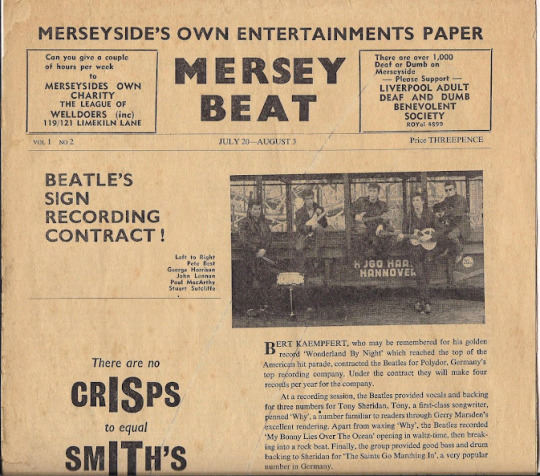
A PHENOMENON CALLED THE BEATLES!
by Bob Wooler [x]
Why do you think The Beatles are so popular? Many people many times have asked me this question since that fantastic night (Tuesday, December 27th, 1960) at Litherland Town Hall, when the impact of the act was first felt on this side of the River. I consider myself privileged to have been associated with the launching of the group on that exciting occasion, and grateful for the opportunities of presenting them to fever-pitch audiences at practically all of the group’s subsequent appearances prior to their last Hamburg trip.
Perhaps my close association with the group’s activities, both earlier this year and since their recent reappearance on the Merseyside scene, persuades people to think that I can produce a blueprint of The Beatles Success Story. It figures, I suppose, and if, in attempting to explain the popularity of their act, the following analysis is at variance with other people’s views, well that’s just one of those things. The question is nevertheless thought-provoking.
Well then, how to answer it? First some obvious observations. The Beatles are the biggest thing to have hit the Liverpool rock ’n’ roll setup in years. They were, and still are, the hottest local property any Rock promoter is likely to encounter. To many of these gentlemen’s ears, Beatle-brand noises are cacophonous on stage, but who can ignore the fact that the same sounds translate into the sweetest music this side of heaven at the box office!
I think The Beatles are No. 1 because they resurrected original style rock ’n’ roll music, the origins of which are to be found in American negro singers. They hit the scene when it had been emasculated by figures like Cliff Richard and sounds like those electronic wonders The Shadows and their many imitators. Gone was the drive that inflamed the emotions. This was studio set jungle music purveyed skillfully in a chartwise direction by arrangement with the A & R men.
The Beatles, therefore, exploded on a jaded scene. And to those people on the verge of quitting teendom—those who had experienced during their most impressionable years the impact of rhythm ’n’ blues music (raw rock ’n’ roll)—this was an experience, a process of regaining and reliving a style of sounds and associated feelings identifiable with their era.
Here again, in The Beatles, was the stuff that screams are made of. Here was the excitement—both physical and aural—that symbolized the rebellion of youth in the ennuied mid-1950’s. This was the real thing. Here they were, first five and then four human dynamos generating a beat which was irresistible. Turning back the Rock clock. Pounding out items from Chuck Berry, Little Richard, Carl Perkins, The Coasters and the other great etceteras of the era. Here they were, unmindful of uniformity of dress. Unkempt-like long hair. Rugged yet romantic, appealing to both sexes. With calculated naivete and an ingenious, throw-away approach to their music. Affecting indifference to audience response and yet always saying “Thank-you.” Reviving interest in and commanding enthusiasm for numbers which descended the Charts way back. Popularizing (more than any other group) flipside items—example, “Boys.” Compelling attention and influencing, wittingly or unwittingly, other groups in the style, choice and presentation of songs.
Essentially a vocal act, hardly ever instrumental (at least not in this country), here they were, independently minded, playing what they liked for kicks, kudos and cash. Privileged in having gained prestige and experience from a residency at the Hamburg Top Ten Club during the autumn and winter of last year. Musically authoritative and physically magnetic, example the mean, moody magnificence of drummer Pete Best—a sort of teenage Jeff Chandler. A remarkable variety of talented voices which song-wise sound distinctive, but when speaking, possess the same naivete of tone. Rhythmic revolutionaries. An act which from beginning to end is a succession of climaxes. A personality cult. Seemingly unambitious, yet fluctuating between the self-assured and the vulnerable. Truly a phenomenon—and also a predicament to promoters! Such are the fantastic Beatles. I don’t think anything like them will happen again.
———
Retrospective from Bill Harry, Editor of Mersey Beat [x]
Editor’s note: Cavern disc jockey Bob Wooler, a Mersey Beat columnist, penned this piece in the August 31 1961 issue of Mersey Beat. How prophetic his last sentence proved to be! In recent years I told Bob I intended to revive Mersey Beat and I wanted him back in the fold as a columnist. Sadly, he died early in 2002 while I was still panning the website.
There are one or two things I would like to point out. The main advertisement on this page was for NEMS record store. Apart from the fact that I regularly discussed the Beatles and the Mersey scene with Brian Epstein each time I dropped copies to him, in addition to the fact that he began to review records for me from Issue No. 3, it is obvious from the sort of coverage, such as this article, which the Beatles were receiving every issue, that Epstein was aware of the Beatles from Mersey Beat and not some youngsters asking for a record in his store some months later. Bob also mentions the impact the group made at Litherland Town Hall. It was Bob who persuaded promoter Brian Kelly to book them for their debut appearance there on that date. It's also interesting to note that the only member of the Beatles mentioned by name is drummer Pete Best. Bob nicked the 'mean, moody, magnificent' tag from Howard Hughes' description of Jane Russell in the movie 'The Outlaw.' As this article was published in 1961, Bob did get something wrong: he mentions a residency at the "Hamburg Top Ten Club during the autumn and winter of last year." They only had residencies at the Indra and Kaiserkeller in 1960, although they made a few appearances at the Top Ten (Their Top Ten residency didn't actually commence until 1961).
#the beatles#bob wooler#1961#mersey beat#august 1961#newspaper clippings#beatles and the press#the humble beginnings#as transcribed in tune in#havent seen this one anywhere on here#been looking for the clipping but havent found it#if youve seen it give a shout#oh found the copy on the mersey beat archives#have to get bill harrys note bc its a great example of how a good story works#not a clipping tho so an august beatles cover is the closest i can get#litherland#december 1961#hamburg era#brian epstein#bill harry#ran into crit bill harry got from other liverpool bands during the early merseybeat days bc he would write so much about the beatles#so its impossible the beatles had missed brians radar before the my bonnie record request#‘beatles sign recording contract’ aww they mean the german label printed my bonnie how cute
28 notes
·
View notes
Text

Brian Epstein at a press conference held at the Saville Theatre after the Beatles’ MBE Investiture ceremony, October 26, 1965. Photo by David Magnus.
254 notes
·
View notes
Text


it’s them! they’re the dreadful little polycule!
#click for quality :)#beatles#beatles fanart#george harrison#john lennon#paul mccartney#ringo starr#the beatles#j + p + g + r#not sure which beatles villain is saying ‘you haven’t seen the last of me’#maybe the mainstream press#maybe it’s pete planning revenge#sound off with ur answers in the notes#got struck with the urge to draw them from a top down angle idk why it just gripped me#also the urge to draw their campy little maimi beach shorts because i think they’re funny#i lobve them :D#bugs under a rock :3 will you squash them or pick them up gently !!!#mentally im destroyed every time i remember the quotes about the four of them sneaking off to sit in bathrooms together to avoid everyone#poking round the door like in midas man except i made it early mop top bois to fit the theme !!!!#say what u want about that movie but I LOVED IT because they got the boys silly little attitudes just right#also pint sized john amused me 👍
77 notes
·
View notes
Text
There’s a Zen story that Yoko once told me… A king sent his messenger to an artist to request a painting, he paid the artist money, and the artist said, “Okay, come back.” So a year goes by, and the messenger comes back and tells him, “The king’s waiting for your painting,” and the artist says, “Oh, hold on,” and whips it right off in front of him and says, “Here.” And the messenger says, “What’s this? The king paid you twenty thousand bucks for this shit, and you knock it off in five minutes?” And the painter replies, “Yeah, but I spent ten years thinking about it.” And there’s no way I could have written the Double Fantasy without those five years.
-
Mick’s put out consistently good work for twenty years, and will they give him a break? Will they ever say, “Look at him, he’s Number One, he’s only thirty-six and he’s put out a beautiful song, ‘Emotional Rescue.'”… And God help Bruce Springsteen when they decide he’s no longer God… Right now his fans are happy. He’s told them about being drunk and chasing girls and cars and everything and that’s about the level they enjoy. But when he gets down to facing his own success and growing older and having to produce it again and again, they’ll turn on him, and I hope he survives it. All he has to do is look at me or Mick. So it goes up and down, up and down — of course it does, but what are we, machines?… When they first criticized “From Me to You” as below par Beatles, that’s when I first realized you’ve got to keep it up, there’s some sort of system where you get on the wheel and you’ve got to keep going around.
#up and down and up again#helter skelter#here we go again#john speaks#songwriting#double fantasy#bruce springsteen#mick jagger#understanding john#fame is hell#beatles and the press#creativity#yoko ono#1980
43 notes
·
View notes
Text
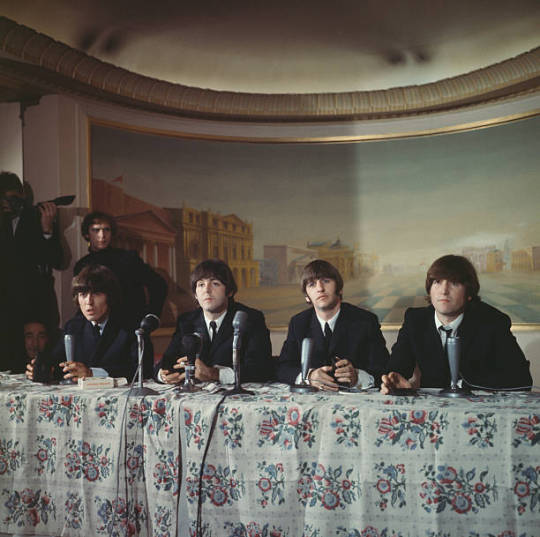
59 notes
·
View notes
Text
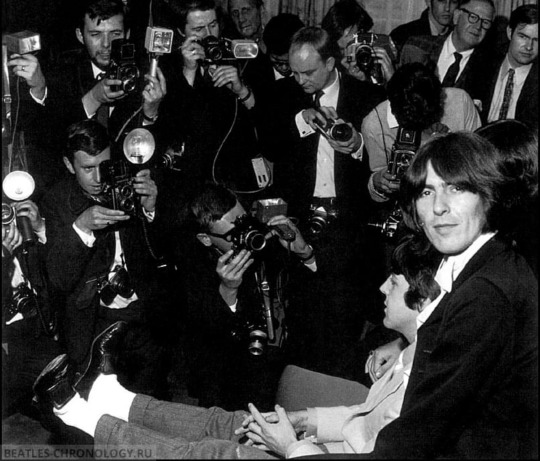









July 8th 1968 - Three Beatles attend a press screening of Yellow Submarine🌷🍀🍁
Press preview of the film, "Yellow Submarine," at the Bowater House Cinema. Paul, George and Ringo attend, and pose for photographers with a life-sized cardboard cut-out of their Yellow Submarine cartoon images. John Lennon does not attend🍁🌷🍀
Via Beatles and Cavern Club Photos FB🪴
#60s icons#the beatles#paul mccartney#george harrison#ringing#yellow submarine#press preview#july 1968
171 notes
·
View notes
Text

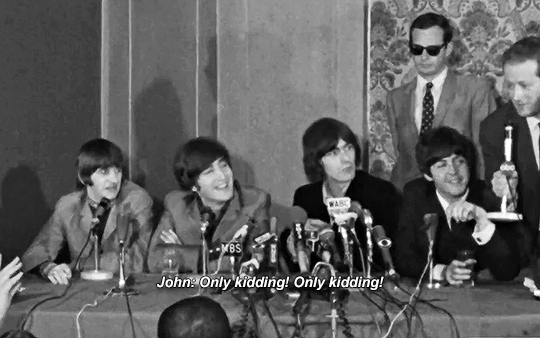
The Beatles - New York press conference (1965)
#they were so done with the press at that point#it stills amazes me how he would say jokes like this so publicly#it’s the kind of joke that i would think in my head but i wouldn’t say it out loud so easily#and he just did it. he really insisted that it was a joke so i assume that he felt a bit bad to have said that#but i admire him for saying this during a PRESS CONFERENCE !! couldn’t be me!#he definitely had guts. and of course back then he was considered the rude beatle but the press was still so fascinated by him#he was really special#also he looked so good that day. they all did. 1965 is a powerful year#john lennon#the beatles#george harrison#paul mccartney#ringo starr#1960s#1965#press conference#classic rock#beatlesedit#edit
732 notes
·
View notes
Text
"We were good friends, and Ed said, 'Walter, Walter, tell me about those kids, tell me about those kids,'" Cronkite said. "'Those kids you just had on the air. What do you call them? The bugs or the beetles or something?'" [x]
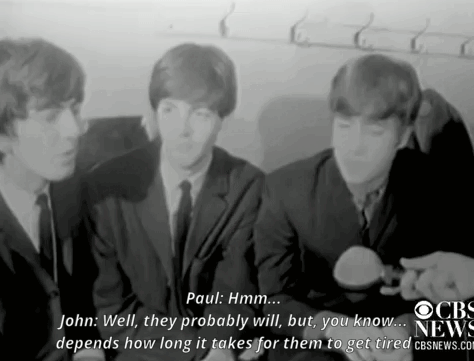
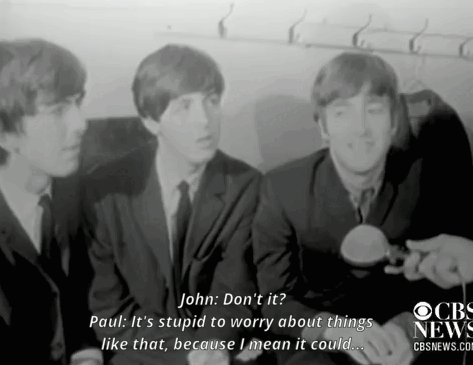
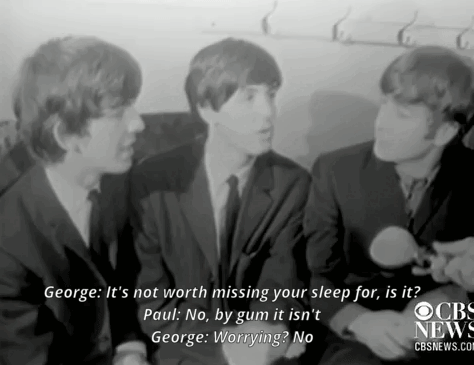
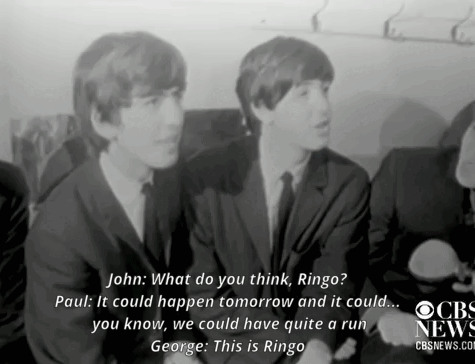
"Do you have any fears that your public eventually will get tired of you and move on to a new favourite?"
The Beatles appearing on CBS News, interviewed by London correspondent Alexander Kendrick, 22nd November 1963. The piece debuted on the "CBS Morning News with Mike Wallace" on Nov. 22, 1963. Slated to run again that night on the "CBS Evening News with Walter Cronkite," it was preempted by the assassination of President John F. Kennedy. Weeks later, on Dec. 10, Cronkite re-aired Kendrick's report. Ed Sullivan called him immediately -- setting in motion the Beatles on CBS again Feb. 9, 1964, with a record audience of 73 million viewers. CBS News reports on The Beatles in 1963
#🐞🐞🐞#reporter addresses paul as ringo#paul answers#george: ‘this is ringo’#😂😂😂#george#og ringo fan#beatles and the press#had no idea the first interview aired the same day#jfk assassination#the ed sullivan show#1963#america
69 notes
·
View notes
Text
Achieved bliss today
#the beatles hyperfixation is draining my bank account like a total disaster#I am determined to collect all of their albums on vinyl#currently I’m on 8/13#bought Let It Be just today#sealed 2021 German press#don’t buy records from GZ media AND Czech records they are total ass#I had to return my copy of Revolver because it was just fucked#and quality control is practically non-existent there#so yeah#The Beatles#song: Across The Universe#vinyl records#vinylcommunity#vinyl aesthetic#music
40 notes
·
View notes
Note
hi!!! is my first time requesting something about yoko so I'm nervous is like coming out of the closet as a yoko fan •́ ‿ ,•̀
I wanted to know if you could do some doodles of Yoko and John, all fluffy and stuff? I absolutely LOVE the elegant design you gave her! I honestly thought she would be interspecies, so their marriage would be even more judged by the press (And remarking more of the hypocrite mindset of it), but the fact that the they're still the same species remark how they still matched each other freak, and we need more yoko ono beauty appreciation frfr. Is okay if you don't want to tho, have a good day!<3
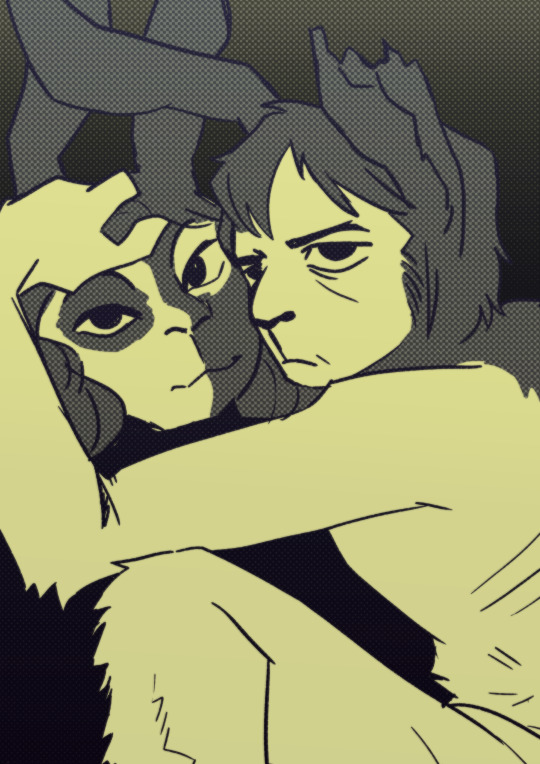
HEHE THANK YOUUU I'm happy to hear you like her design!! :D Sorry I can't do much doodles currently cause I'm con-prepping but here's a doodle I've been wanting to do of them hehe
The reason I made Yoko the same species (or at least, a similar species but a different subspecies) is that in Zootles canon, John doesn't really go out of his way to seek out non-lagomorph partners (Cynthia had been a rabbit too). For all the bravado he has against Carnivores and bigger Herbivores, he's all bark and no bite and interspecies relationships Scare him to half death (see: Paul. And yes, it Was a relationship)
Yoko is a Harlequin Rabbit! In Beastars and Beast Complex canon, Harlequin Rabbits were considered royal breeds and often portrayed as snobbish and lowkey unlikeable by the other rabbits in the series. I think it's a funny thing to potray Yoko as this strange rabbit breed.
Press would often label them as "World's Most Hated Herbivore Couple". John, who'd been a symbol for Herbivore empowerment back then, became a sort of stain on the Herbivore community and Yoko took the brunt of it as well when The Zootles finally broke up. Hell, not even the rabbits appreciated them with how John really fueled the "rabbits are unfaithful creatures" stereotype.
Neither of them were really that well liked...
#the beatles#beatles#the beatles fanart#the beatles art#beastars#beastars au#john lennon#yoko ono#doodle#art#digital art#drawing#bandom#band art#band fanart#crossover#alternate universe#The Zootles#bnuuyyyyy#Worst Bnuuys In History as the press would say#Also request answers maybe slow cause the convention is next week and I'm con prepping :)
32 notes
·
View notes
Text
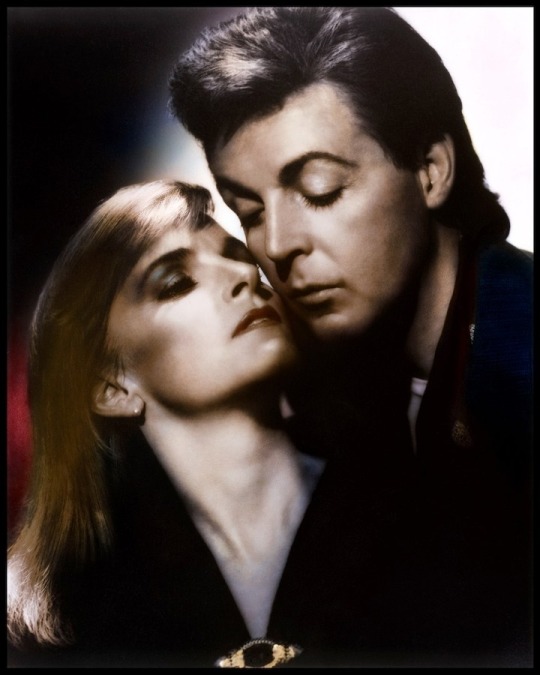
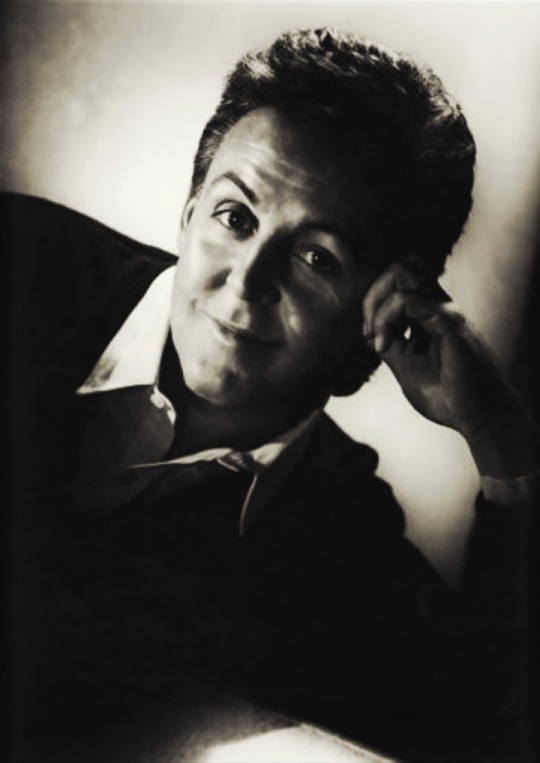
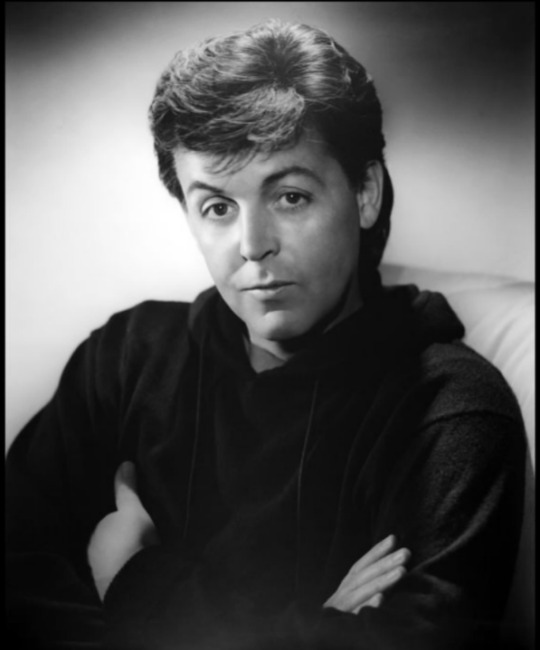
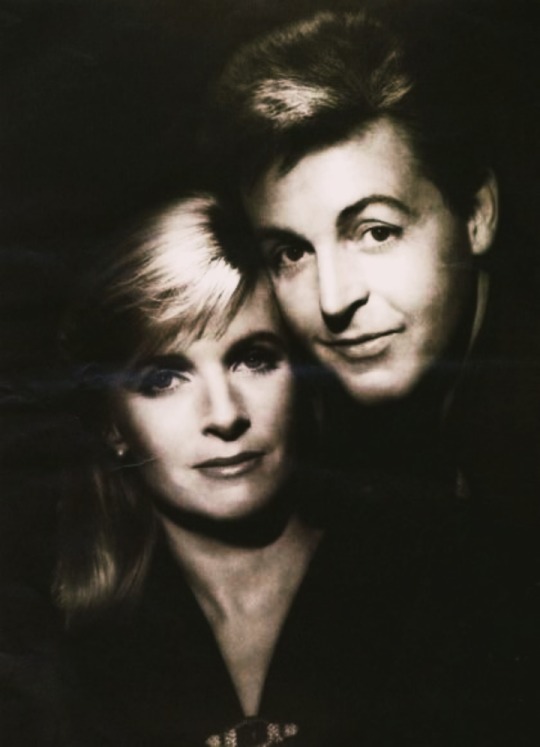

Paul and Linda McCartney. Álbum 'Press To Play' Photoshoot. 1986.
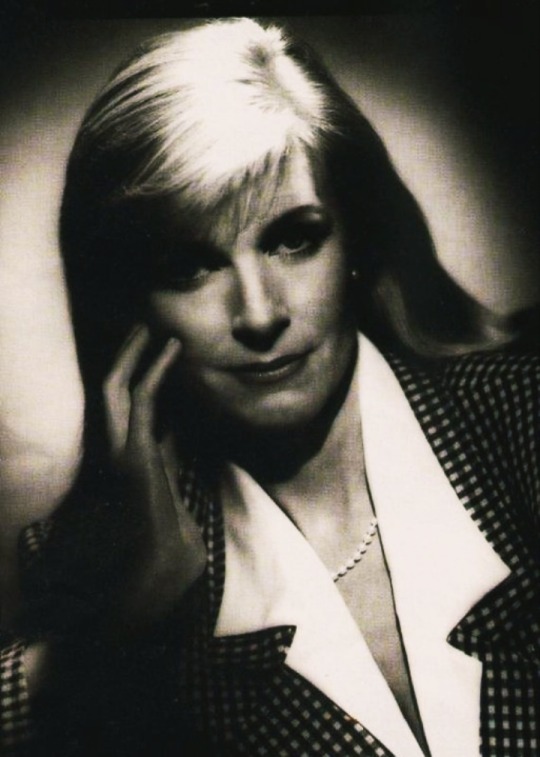
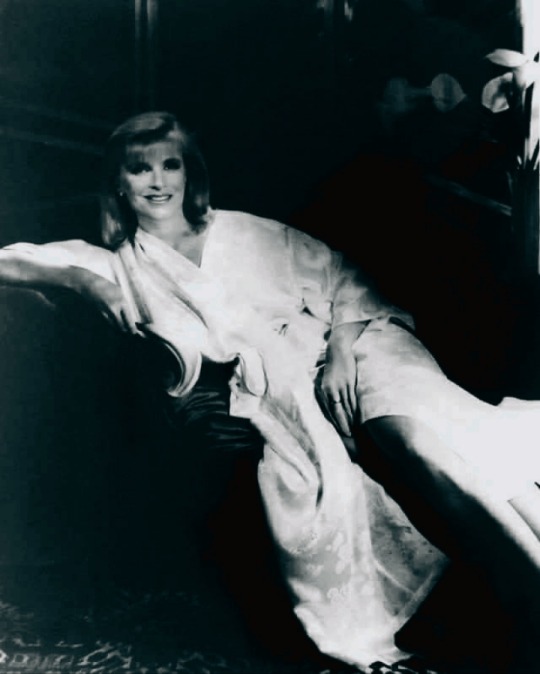
📸 1, 2, 3, 6, 7: George Hurrell.
📸 5: Mary McCartney.
#paul mccartney#60s couples#paul and linda#linda mccartney#the beatles#beatles girls#press to play#mary mccartney
35 notes
·
View notes
Text

Ok, WHAT???
#idiot press#the beatles#george harrison#paul mccartney#john lennon#ringo starr#fab four#beatlemania#beatles 64
32 notes
·
View notes
Text
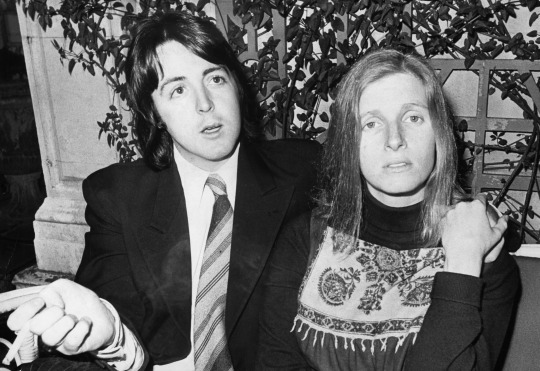
PAUL and LINDA McCARTNEY at Les Ambassadors Club in London at the wrap party for THE MAGIC CHRISTIAN. May 4, 1969.
#NEW PAUL AND LINDA PIC!!#i am so happy!!#look at them!!#and lin is expecting mary during that time#funny how paul would deny her pregnancy in the interview jnaskjasjas#i get it he didn't want the press up on them X(#paul mccartney#linda mccartney#1960s#60s#1969#the beatles#my edits#my edit#technically is an edit because where i got this i screencapped it because hq supremacy!
227 notes
·
View notes
Text
Was just playing that Can't By Me Love (Beatles) Game on itch.io and my Spotify decided to play Boss Ass Bitch right as Paul answered the door at the very beginning.
I fully thought it was just part of the game-
#It was so funny and unhinged#i literally though there is no way this isn't just part of the game#like it made so much sense and suited Paul so well XD#I pressed the homekey and realised that my spotify was open because an ad started playing- TwT xD#the beatles#paul McCartney#mclennon#john lennon#paul mccartney#ringo starr#george harrison
23 notes
·
View notes
Text

errkay major autism win
#not pictured: a new pressing of pet sounds bc every first edition record is a million dollars#george harrison#the beatles
17 notes
·
View notes
Text










January 17th 1968 - The Beatles attend Grapefruit press launch🌻🌺🌻
Grapefruit was a London-based band, brought together by Terry Doran of Apple Publishing, the music publishing company started and owned by the Beatles. The band was formed late 1967, was given its name by John Lennon, and to promote the release of their first single, "Dear Delilah" press conference was organized with three Beatles joining🌺
Via Beatles and Cavern Club Photos FB🌹
#60s icons#girlsofthesixties#60s couples#beatles girls#60s muses#grapefruit#press launch#john lennon#ringo starr#brian jones#cilla black#paul mccartney#jane asher#paul and jane#1968
35 notes
·
View notes